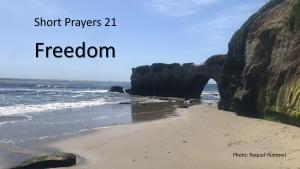 Short Prayers? What about free will? What about Christian freedom? What about liberation theology?
Short Prayers? What about free will? What about Christian freedom? What about liberation theology?
Our Enlightenment values come in a single package: freedom, dignity, equality, community, and responsibility. Poverty constricts and restricts freedom. Poverty constricts and restricts dignity, equality, community, and responsibility as well. Is there any connection between distinctively Christian freedom and Enlightenment freedom?
For freedom Christ has set us free! (Galatians 5:1a)
Poverty Constricts and Restricts Freedom
I walk into Mary’s apartment on the south side of Chicago. As I enter I can see her supper cooking on the stove. What does she eat? Just one bag of fresh frozen green beans being warmed in boiling water. Dirty laundry is piled neatly in bags, waiting for someone with the quarters to take them to the Laundromat for washing. She has no money to wash. Nor curtains on the windows for the same reason. Mary is depressed. Very depressed. She stares at the window. She has seriously contemplated suicide twice.
Mary is poor. She is black. She is pretty. She is about forty years old, intelligent and articulate. Yet, it is the welfare department who pays the rent on this one room dump, ninety dollars a month. She receives $28 per month to supplement her food budget…to supplement a non-existent food budget. They won’t pay any more.
Now it is important to note that Mary has not always been on welfare. She had a happy youth. She grew up in a small town in Indiana. Her father was a lawyer and a respected member of the community. Her older brother had been a professional musician. Mary is bright. She went to college on a scholarship. She has taste. She listens to classical music. She loves Stravinsky’s “Firebird Suite.”
Why, then, is she poor? The answer is bad health: her family’s and her own. And the bad health of our society. Her father passed away. When her mother then came down with cancer, Mary stuck close to her, caring for her over a seven year period. Medical bills mounted up with the insurance companies only paying for their contracted portions. First, they had to sell their cottage on Lake Michigan. Then their classical record collection. Then the car. Then the furniture. Finally, their home. After nearly all the assets were gone, Mary’s mother died.
Now, ready to support herself, Mary was ready to go to work. But then an auto accident so damaged her legs that she cannot walk for more than a few minutes without collapsing. She lost her newly found job, because her boss did not want to pay for a crippled secretary. With no assets and no income, Mary turned to the welfare department. There she sits. No wonder Mary is depressed.
Is poverty a prison?
Mary is in a prison. This prison has no bars on the window or keys to lock the door. There are no armed guards. Nevertheless, it is a prison just the same. It is an economic prison.
What was Mary’s crime? Her crime was that she got sick. The penalty for getting seriously sick in modern America is twofold: first, you lose your income; second ,you lose your savings.
When right-minded people around the world look at America with its stupendous Gross National Product, its tremendous wealth and power, its overwhelming affluence, and then see the millions of people who are imprisoned by poverty through no fault of their own, it is disturbing to say the least. Poverty in America must be a stench that smells all the way up to heaven. In every presidential campaign right down to 2020 I recall candidates promising to fix “health care” in America. Yet, it continues to be broken. And it continues to break those who need care.
Like St. Paul, liberation theology tells us that it is for freedom that Christ set us free. Christ has set us free from self-centeredness. Christ has set us free to love the neighbor and to love God. Christ has set us free to support justice out of compassion for those who also need freedom. These are the concerns of liberation theology.
I ask myself: what kind of freedom does Mary know? The word ‘freedom’ in our world today generates many questions, most of which go without satisfactory answers.
PRAYER
O Holy One of Israel who liberated your slaves from the chains of the Egyptians and freed us from sin by the cross of Jesus Christ, spread your freedom to those still in bondage. Amen.
▓
Ted Peters is a Lutheran pastor and emeritus seminary professor. He is author of Short Prayers and The Cosmic Self. His one volume systematic theology is now in its 3rd edition, God—The World’s Future (Fortress 2015). He has undertaken a thorough examination of the sin-and-grace dialectic in two works, Sin: Radical Evil in Soul and Society (Eerdmans 1994) and Sin Boldly! (Fortress 2015). Watch for his forthcoming, The Voice of Public Christian Theology (ATF 2022). See his website: TedsTimelyTake.com.
▓













